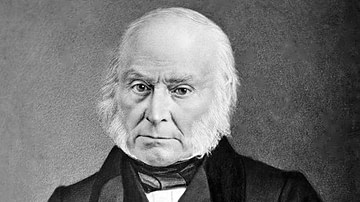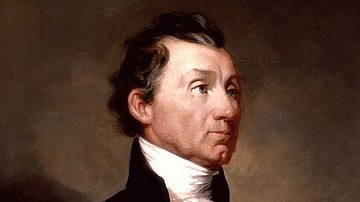Search Definitions
Browse Content (p. 7)

Definition
John Quincy Adams
John Quincy Adams (1767-1848) was an American statesman and diplomat who served as the sixth president of the United States (1825-1829). The son of a former president, Adams had a long and distinguished political career both before and after...

Definition
Berenike IV
Berenike IV (r. 58-55 BCE) was queen of Ptolemaic Egypt and the older sister of Cleopatra VII (r. 51-30 BCE). She ruled briefly after her father Ptolemy XII was overthrown by a popular rebellion. Berenike IV's reign ended in 55 BCE when her...

Definition
James Monroe
James Monroe (1758-1831) was an American statesman who served as the fifth president of the United States (1817-1825). The fourth president to belong to the so-called 'Virginia Dynasty', and the last of the generation of the Founding Fathers...

Definition
First Agricultural Revolution
The First Agricultural Revolution, beginning c. 12-20,000 years ago, was characterized by the emergence of different agricultural systems in different parts of the world, whose common trait was the use of native species. Although agriculture...

Definition
War of 1812
The War of 1812 (1812-1815), referred to by some contemporaries as the Second American Revolution, was fought between the United States and the United Kingdom. Often remembered only as a sideshow to the Napoleonic Wars, the war had some long-term...

Definition
Auschwitz
Auschwitz was a concentration and extermination camp in German-occupied Poland operated by the Nazi SS from 1940 to 1945. Around 1.1 million people died at the Auschwitz complex from overwork, malnutrition, disease, and in the gas chambers...

Definition
Iranian Revolution
The Iranian Revolution (1978-1979) was the social movement that arose from widespread and diverse discontent with the monarchic government of Iran. The revolution was fought against the regime of Mohammad Reza Shah (r. 1941-1979), and it...

Definition
Ptolemaic Police
Ptolemaic police, or phylakitai, were responsible for law enforcement throughout Ptolemaic Egypt. The existence of a professional police force made Egypt different from ancient societies like the Roman Empire, which had no police. In addition...

Definition
Alfred Rosenberg - The Infamous Nazi Race Theorist
Alfred Rosenberg (1893-1946) was an Estonian-born Nazi who propounded anti-Semitic racial theory and anti-Christian values. Rosenberg's theories matched those of the leader of Nazi Germany Adolf Hitler (1889-1945) and were used to justify...

Definition
Kappa
A kappa is a Japanese mythological water sprite or, literally, "river child" (河童). One of the more popularly known yōkai (Japanese mythological creature) in Japan, kappa are generally green or yellow, have a tortoise-like shell on their backs...